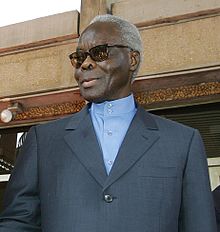Mathieu Kérékou
(Ahmed) Mathieu Kérékou [ matjø keʀeku ] (* 2 September 1933 in Kouarfa ; † 14. October 2015 in Cotonou ) was 1972-1991 President of the People's Republic of Benin , and between 1996 and 2006 President of the Republic of Benin .
soldier
Kérékou came from the north of the then French Dahomey. He joined the French army and attended military schools in Senegal and later in Mali . In 1961 he joined the army of Dahomey, which had been independent since 1960, and became Hubert Maga's adjutant . In December 1967 he took part in the coup of young officers led by Maurice Kouandété against General Christophe Soglo . From 1968 to 1970 he attended a military academy in France and later became Deputy Chief of Staff of the Army.
President 1972 to 1991
On October 26, 1972, Major Kérékou carried out a coup against President Justin Ahomadegbé-Tomêtin . Ahomadegbé-Tomêtin and the two other members of the Presidential Council , in addition to Maga also ex-President Sourou-Migan Apithy , were imprisoned until 1981.
Kérékou proclaimed himself president and ruled the country with a Marxist-Leninist orientation. The African Cuba was to arise in Benin . In 1974 he also became chairman of the newly formed Politburo . He succeeded in restoring the civil order in the country, which had largely collapsed since the country's independence. During his tenure, the country was renamed from Dahomey to Benin in December 1975. As a unity party , he founded the Parti de la révolution populaire du Bénin . While Benin had nine heads of state in the first twelve years, some with very short terms in office, and a whole series of coups, Kérékou ruled for more than 18 years in a row. In 1979, 1984 and 1989 he was re-elected under the terms of a one-party state.
In 1989 and 1990, the population forced a sovereign national conference of all relevant social groups under the leadership of the Catholic Archbishop of Cotonou , Isidore de Souza , in the face of growing tensions due to the catastrophic economic situation . It laid down the guidelines for a new democratic beginning, including the abandonment of the Marxist-Leninist doctrine, the introduction of a multi-party system , the establishment of a presidential democracy , the admission of political parties, respect for human rights, freedom of expression, freedom of assembly and freedom of the press, and the introduction of the market economy. This made Benin the first African country to make a peaceful transition from Marxism-Leninism to a democratic multi-party system after the Cold War . Increasing pressure from international donors also contributed to this. In addition, there was the dissolution of the Eastern Bloc , which had previously supported Benin.
A provisional council of former presidents Kérékou placed the former director of the World Bank Nicéphore Dieudonné Soglo as prime minister. In the elections in March 1991 Kérékou was defeated with around 32% of the vote Soglo, who replaced him on March 4, 1991 as president. Kérékou was assured immunity for all acts during his tenure.
President 1996 to 2006
The following elections could Kérékou then decide with 52.49% of the votes in the second ballot against Nicéphore Dieudonné Soglo on March 18, 1996 for themselves. In the 2001 elections he was re-elected. In the second ballot on March 22, 2001, he achieved 84.06%, with part of the opposition boycotting the elections. In contrast to his rule from 1972 to 1991, he now relied on a liberal economic policy and maintained good relations with the western world. The circumstances of his re-election in 2001 were the subject of proceedings in the USA in March 2005 . The Californian company Titan Corporation accepted a fine totaling US $ 28.5 million for supporting Kérékou's election campaign with US $ 2.1 million, which is prohibited under American law.
On July 11, 2005, he stated in a speech that he did not intend to amend the constitution in order to run again in March 2006. The constitution states that a presidential candidate cannot be over 70 years of age and allows a maximum of two terms in a row. He was therefore replaced by Thomas Yayi Boni in the March 2006 elections .
Private
In September 1980, after a visit to Libya , Kérékou converted to Islam and changed his name from Mathieu to Ahmed. Over time, he returned to Mathieu and eventually became a born again Christian .
literature
- Jean Establet: Mathieu Kérékou. L'inamovible président du Bénin . L'Harmattan 1997., ISBN 2-7384-5725-8
Individual evidence
- ↑ Sam Roberts: Mathieu Kérékou, Dictator Who Ushered In Democracy in Benin, Dies at 82. In: The New York Times , October 15, 2015 (English). Retrieved October 16, 2015.
Web links
- The BBC on Kérékou, August 20, 2003 (English)
- The BBC about the case "Titan Corporation," March 2, 2005 (English)
- IRIN NEWS to Kérékou speech, July 12, 2005 (English)
- Government of Benin: Short biography of Kérékous (French)
- Painting: Portrait of Kérékous
| personal data | |
|---|---|
| SURNAME | Kérékou, Mathieu |
| ALTERNATIVE NAMES | Kérékou, Ahmed Mathieu |
| BRIEF DESCRIPTION | Beninese politician, President of Benin |
| DATE OF BIRTH | September 2, 1933 |
| PLACE OF BIRTH | Kouarfa |
| DATE OF DEATH | October 14, 2015 |
| PLACE OF DEATH | Cotonou |
